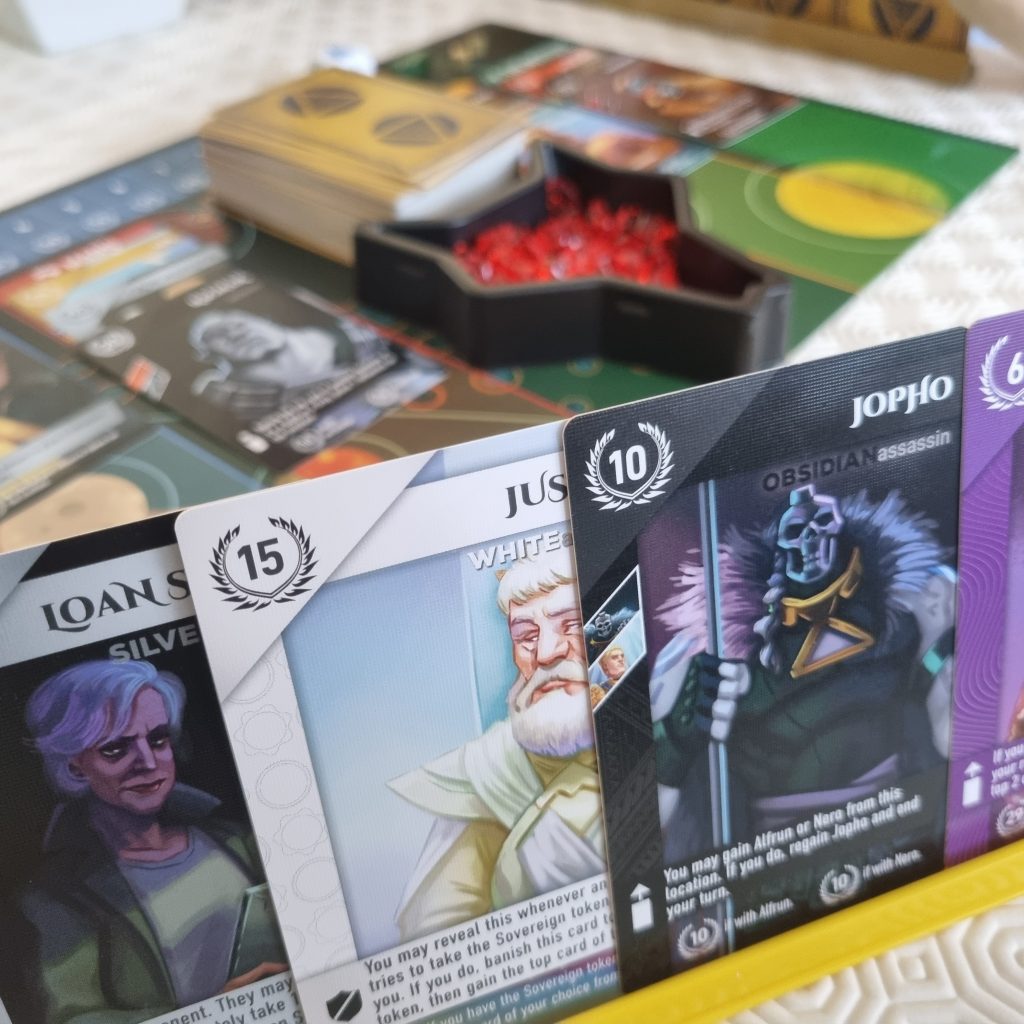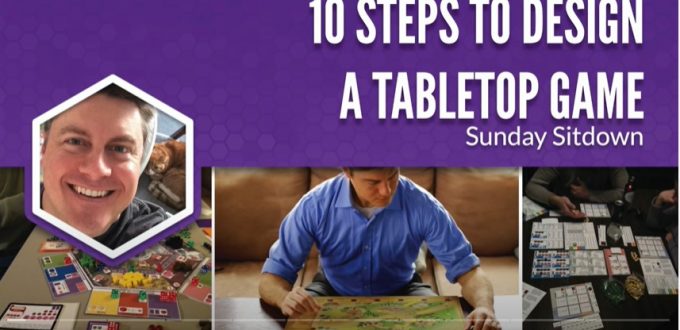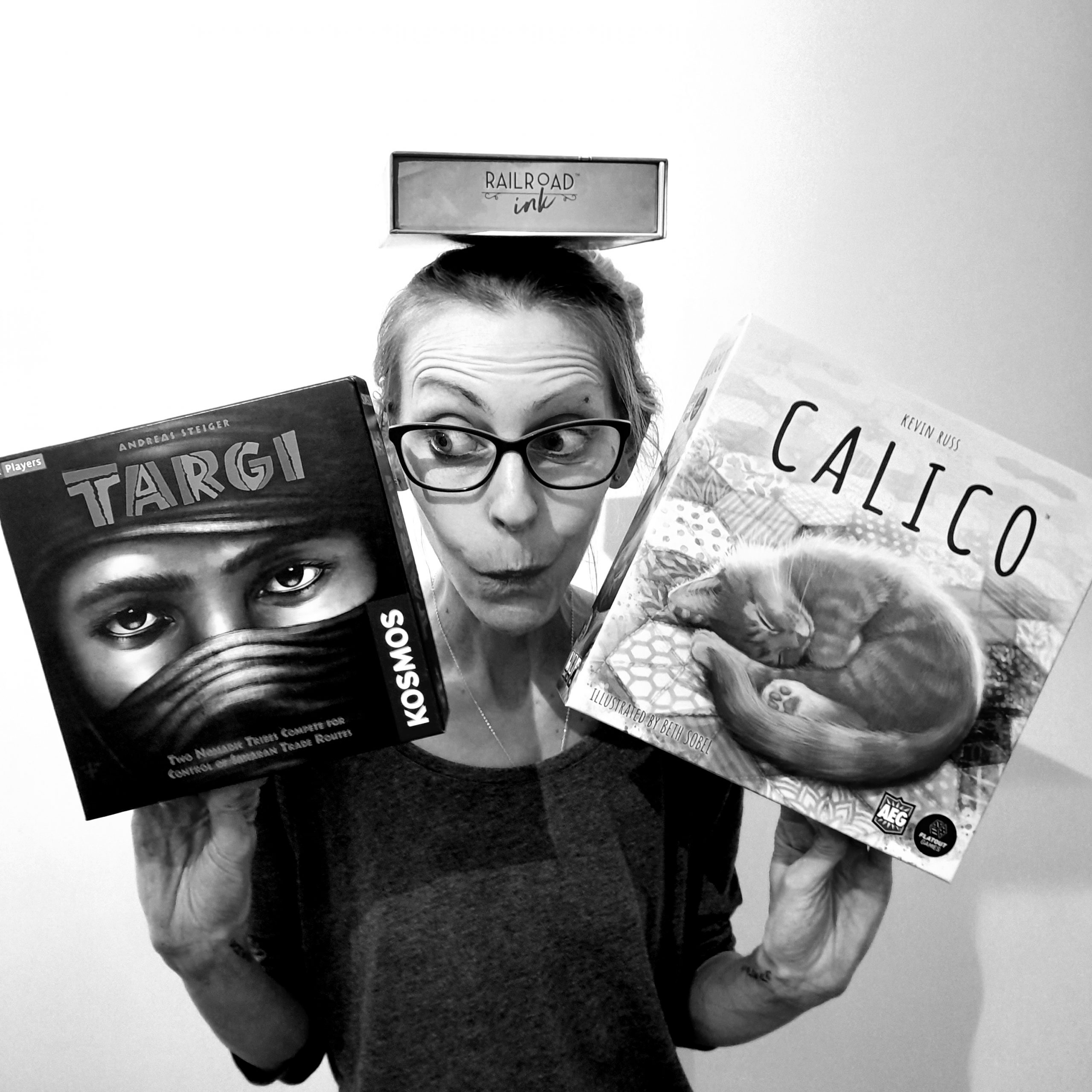We snatched a few moments with Jamey Stegmaier to find out a little more about the man behind the Stonemaier Games logo.
Possibly the most open man in board gaming, the CEO of Stonemaier Games is not afraid to share. The good, the bad, the ugly; Jamey Stegmaier has spent the last 15 years posting the inner workings of his mind on the internet. Whatever he is doing, however, he must be doing something right. Stonemaier Games has published a fantastic range of games and shows no signs of stopping.
Jamey, thank you so much for chatting with me today. As you probably have eleventy billion things on your agenda, let’s dive straight in.
Let’s do it! I’m looking forward to this.
Why board gaming?
I’ve connected with tabletop games since I was a kid. At its heart, I really enjoy creative problem solving as a way of connecting with other people, and games provide an excellent, low-stakes medium for doing that.
You are very open about the inner workings of all aspects of your game design, production, publication, and distribution process. Everything is laid bare on stonemaiergames.com Why?
A big part of it is simply that it feels like an impactful way to spend my time. My goal for those articles and videos is to add value to others and generate conversation. Also, it’s a helpful way for me to process my thoughts on a variety of topics (and learn from others in the comments).
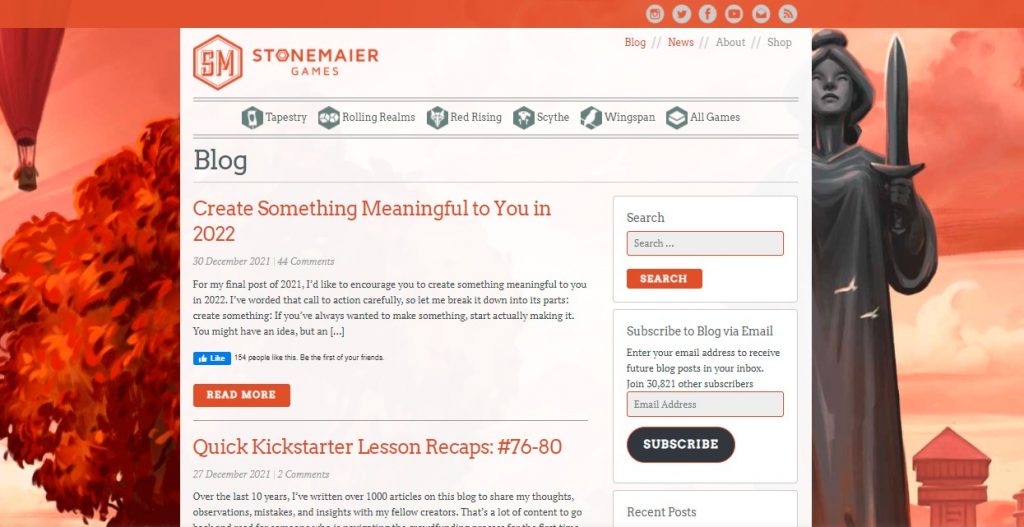
Our community seems to be a driving force for you – if there was nobody reading your blog or watching your YouTube channel, would you still post/create?
The number of views aren’t a motivating factor for me, but I don’t create in a vacuum—I create for the purpose of consumption, community, and discussion. So if there was truly nobody consuming my content (blog, YouTube, games, etc), I wouldn’t continue to create that content.
Your website is also very clear about the design parameters Stonemaier games must follow (“the 12 Tenets”) – an industry best practice guide. Do you evaluate all the games you play socially by those same rules?
The tenets definitely inform my designs and the games we consider from other designers, and while they come to mind when I’m trying to figure out why I’m enjoying (or not enjoying) a published game, mostly when I play games I’m just trying to have fun and learn from what the designer did, even if it’s vastly different than my standard methods.
You have also been very honest online about the lessons learned in previous Stonemaier projects. Are your mistakes more interesting to you than your successes?
Absolutely. I’ve made so many mistakes (and I’ll continue to do so), and I really like to step back and learn from them. I also think it’s helpful to share my mistakes so others don’t need to learn the hard way by repeating them.
That’s a really refreshing outlook – very different to the “pay your dues” attitude of a lot of corporation heads.
You recently launched your European store – was that always in the pipeline, or as a direct response to the shipping (and profit!) crisis caused by the Pandemic?
We’ve had various fulfilment centres in Europe for around 8 years now (same with the US, Canada, and Australia); the difference this year is we decided to create a separate storefront for each fulfilment centre instead of routing everyone through the same store. That way we could use local currencies and display the specific inventory levels for each fulfilment centre instead of lumping them all together. It wasn’t connected to the pandemic.
Ah okay – so more to do with simplifying the B2C process for the benefit of your customers. Speaking of the Pandemic, however, your print and play turned living card game, Rolling Realms, is hitting gaming tables all over the world now. Did you worry about public opinion about monetising something that was free to play?
Originally, it wasn’t a factor at all, as I didn’t design Rolling Realms as something to sell; rather, I designed it to connect with people during the early days of pandemic self-isolation. When I realized that it was actually a really fun game, I was committed to making a version of the game that would justify the expense (while keeping that expense low—it’s a $20 game).
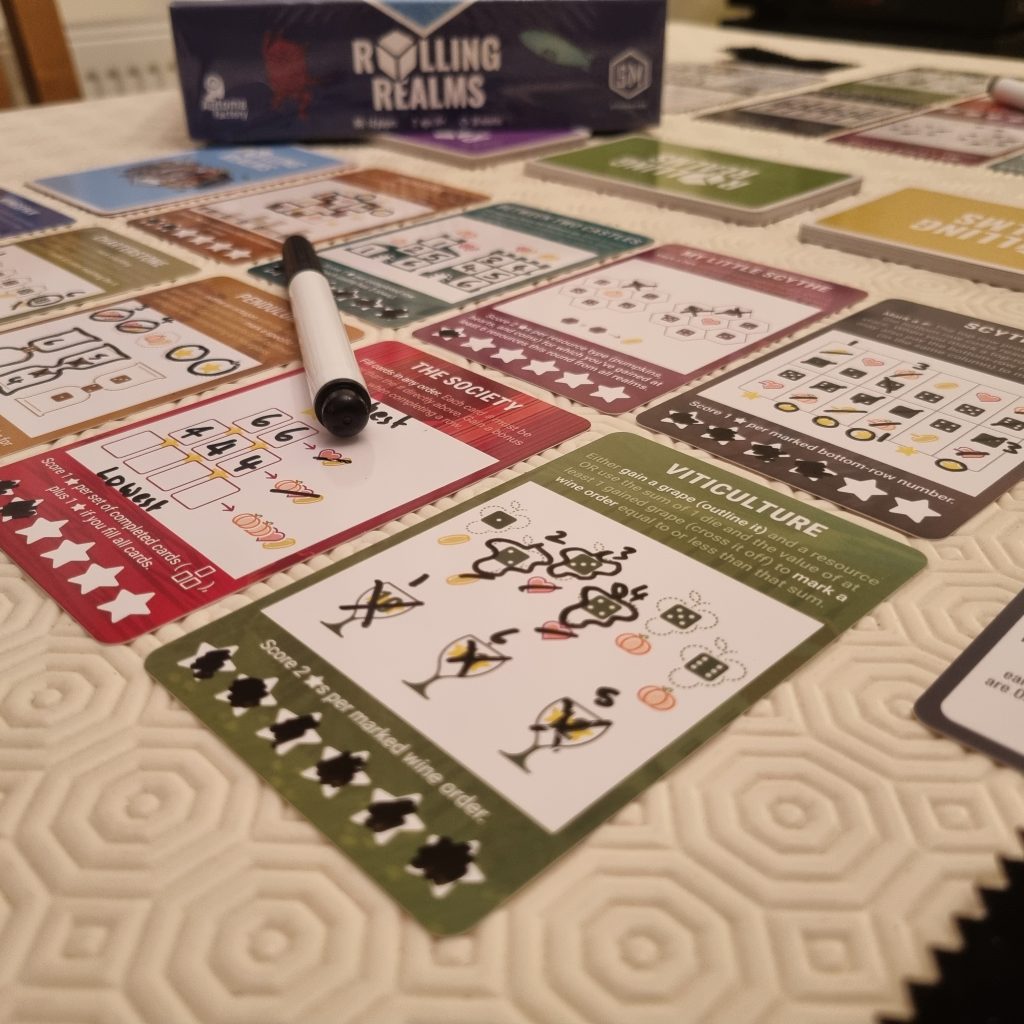
I bought a copy of Rolling Realms and I love the idea of a living roll and write (Terra Mystica expansion pack is tempting me already!). Be honest, how early into the design process of future games will you consider their application in Rolling Realms? ?
That’s the nice thing about using cards as realms: It’s very easy to expand Rolling Realms as we create other games. I didn’t anticipate adding games from other publishers (like Terra Mystica), but that’s become a really fun aspect of the game. For future games we publish, I have a reminder in my calendar to design the realm when the development process for the game is almost complete.
How exciting! I never collected or traded cards as a kid, but those little packs are going to be added to my wish list every time a new one drops! 🙂
Another positive effect of the global lockdowns has been the growth of digital and online gaming; connecting with people over a shared passion for gaming which is not limited by geography or time zones. As a fellow new member to Board Game Arena (BGA), is this a permanent shift for you towards playing virtually?
I rarely play digital games, but I’ve enjoyed playing games with friends on BGA every other week (I host an in-person game night on the off weeks). I think it may be a semi-permanent shift for me, simply because I can play games that way with friends from around the world instead of only my St. Louis friends.
Do you play your own games on BGA? Do you win?
I have played Tapestry on BGA, though I can’t remember if I’ve played Viticulture there yet. Tapestry as an alpha game, and it broke before we could finish. 🙂
Haha I believe you……….. 😉
Well I adore my copy of Wingspan (and so do 1 million other gamers I hear!) but I also have the app on my tablet and phone. Mainly for times when I don’t have access to my physical copy or even a table, but still have a hankering to play beautiful birdies (our group nickname!). For me, it will never replace the real thing, but the portability and convenience is undeniable. How do you feel (both personally and from a business perspective) about gamers accessing Stonemaier games on devices rather than in cardboard form?
Ultimately, we create our games to be played on the tabletop. But as you express here, there are reasons and situations to play a game digitally, and digital games can really help with the learning process. So I’m happy for people to experience both the tabletop and digital versions of our games, especially if one leads to the other and vice versa.
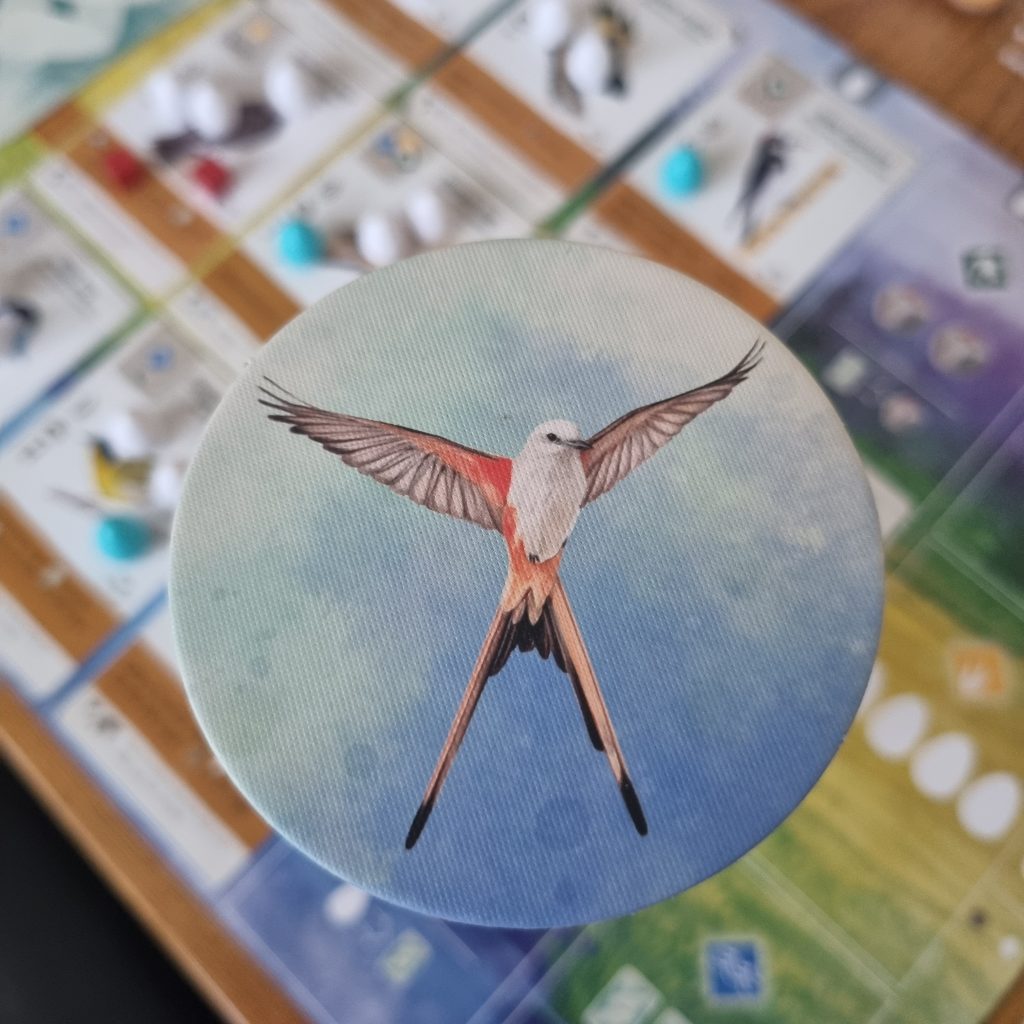
Do you get involved in the digital adaptation process?
We license the rights of our games to digital partners we trust, and we’re very minimally involved in the process. Part of my co-worker’s job (Joe) is to test each digital game once at each stage just to make sure it’s an accurate representation of the game.
Now that would be a fun job to have! Let me know if you ever need another willing gaming guinea pig haha!
Being a jack of all trades when it comes to board games, where is your heart? Design? Corporate? Playing?
I love variety, so I really enjoy doing a little bit of each. I’d burn out if I just focused on design or development or if all I did was media creation, marketing, customer service, or operations.
Very sensible plus it helps keeps things fresh. – variety is the spice of life!
You have made significant efforts over the last 12 months to enhance the diversity of your partnerships and team. You have also hired Lydia Wehmeyer as a Diversity, Equality, and Inclusion consultant and Kate Edwards as a Cultural Consultant. Why not sooner?
One of my core principles is that I believe in paying people for their time and talents. We pay our lead play testers and our proof readers (among many independent contractors in a variety of fields). The common thread for all of them is that I present them with a task to complete (i.e., playtest this game 3 times, fill out a form for data, and send me your final thoughts in writing). It’s very task-oriented. But I can’t recall ever hiring a consultant of any kind before this year, and I think the reason is it’s not a particularly task-oriented role. It’s so nebulous: Give me advice…sometimes? Especially when I already consume a lot of media about these topics—is a consultant necessary when you’re committed to doing the research work yourself?
A number of game companies have been criticised for not actioning harm; not re-visiting older games to see whether they are still appropriate when viewed by today’s standards, or publishing insensitive and inappropriate designs.
I’ve heard too many stories about games or companies causing harm to people (mostly unintentional, but harm is harm), and so I decided—first with Kate and then with Lydia—that I wanted to pay some experts for their time and talent to decrease the potential for harm (and increase the potential for joy for a wide variety of tabletops worldwide).
2020 was a hard year for both Stonemaier Games (as did nearly all businesses in reality) and Jamey Stegmaier, the man behind the logo. You took a number of direct hits on social media. Do you feel like your personal stock is on the upward trend again?
I appreciate you asking, but it really isn’t about me at all. My goal through Stonemaier Games is to bring joy to tabletops worldwide. A huge part of the “worldwide” refers to including and engaging a vast diversity of people (gender, ethnicity, culture, age, sexuality, etc)—that’s the goal, not my personal stock.
Okay well let’s look to hopefully brighter times – Stonemaier Games has a very full 2022 release calendar! Lots of secret games in various stages of design and production. What excites you most about a new game?
I’m always excited to see how people connect with a game when they start to share stories and photos of their first plays.
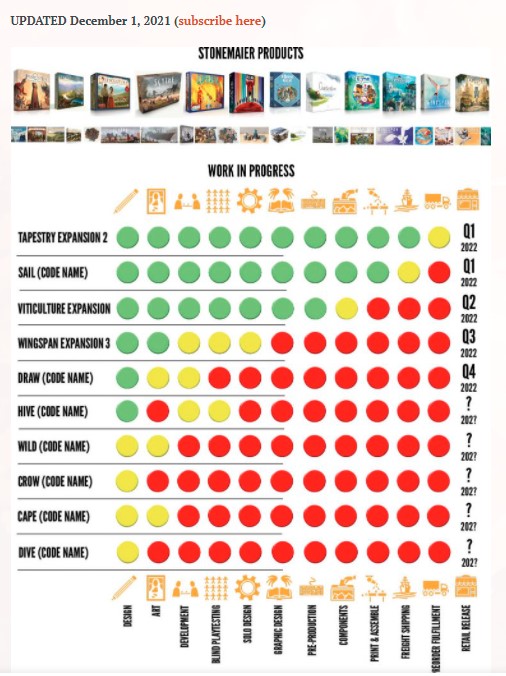
Where would you like to see Stonemaier Games in 10 years’ time?
That’s something I’ve been thinking about a lot lately. Overall, I just want to accomplish our mission statement better every day. So hopefully we’ll bring joy to tabletops worldwide exponentially better in 2031 than in 2021.
Well I am certainly looking forward to the next decade full of more Stonemaier gaming joy! Are there any particular designers, artists, or creators you would like to work with during this time?
There are indeed, and I’m currently working with several of them—that’ll have to remain secret for now. 🙂
Ohhhh tease! Okay, neutral territory; What ideas can you not stop thinking about right now?
Many of my thoughts for the last 5 years have been about my massive open-world cooperative game. It’s still taking shape, but I’m really enjoying the process.
Hmmmm…..a little hint there as to what’s in store. Nice! So, what kind of gamer are you?
I’m an omni-gamer, though I get the most excited about medium-weight Euro games.
Could that be another hint?????? Ha ha, Alright, I won’t pester. One last question just for fun. if you could play a board game with anybody (real or fictional), who would it be, what game would you play, and (perhaps most important of all!) what snacks would you choose? ?
Well, this interview is with you, so I would say I’d have fun playing a game of your choice with you! I always love fresh-baked chocolate chip cookies, so they would be among the snacks.
Goodness – what an honour! Well, in that case, with a trip to the US sadly not on the agenda for some time yet, I would love to meet you around a BGA table one day soon! At least that way your snacks will be safe! haha
Thank you again for taking time out to chat with me, Jamey. It has been a really interesting insight into the Stonemaier Games world and the man behind some of my own personal favourites! I’m off to play Red Rising with my husband. Jamey; if you have any strategy tips, by all means feel free to email me!!! haha
